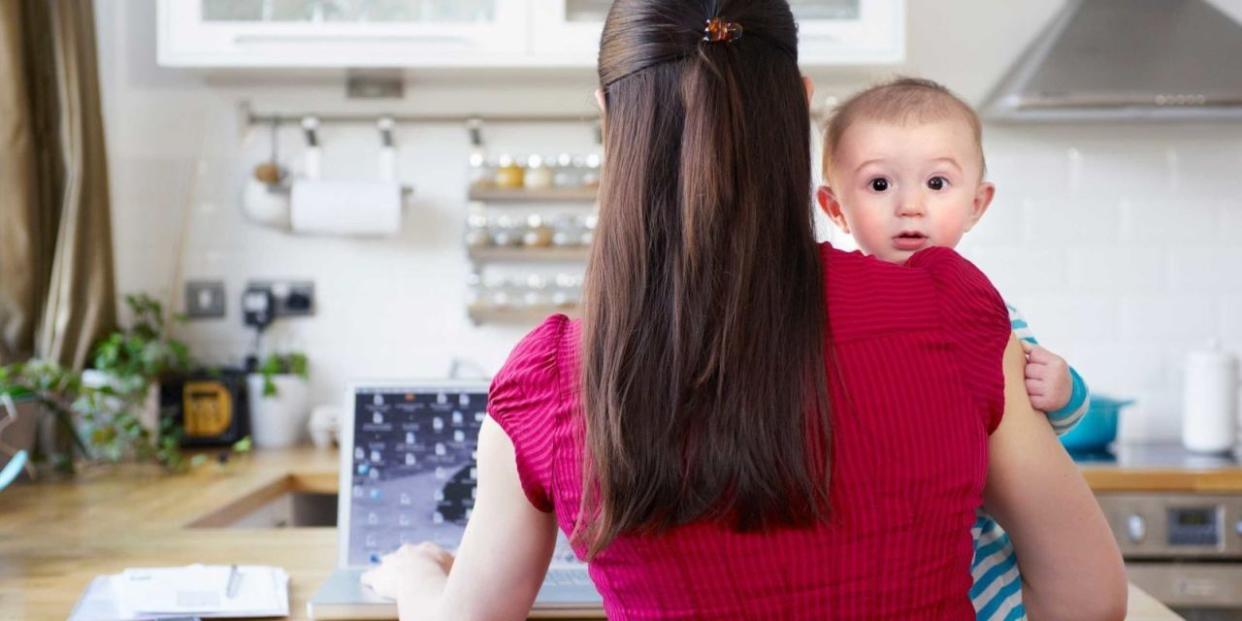Moms Who Post a Lot on Facebook Are More Likely to Be Depressed

Giddy with excitement, you announced your pregnancy on Facebook with a sonogram photo. You kept friends and family informed in those oh-so-blissful months that followed, posting pictures of your growing belly, and a smattering of sweet shots from your baby shower. And of course, once Junior arrived, you couldn't help but post photo after photo of your brand-new addition — and you're certainly not the only mom to take her baby business to social media.
But, new research reveals that the more frequently a new mom posts to Facebook, the more likely she is to suffer from depression after nine months of parenthood.
According to a new study published in the journal Sex Roles that looked at the Facebook habits of women who had recently had babies, the popular social network is a place that "undermines well-being," and "those who felt societal pressure to be perfect moms ... posted more frequently than others to Facebook." Researchers also found that new moms who were more concerned with "external validation" went to Facebook to receive it — whether through posting statuses or uploading photos.
Because the sample size was small (127 mothers from Ohio) and homogenous (85.7% were white; 87% were married; almost 80% completed college; and about half were employed), the researchers from Ohio State University conceded that their findings may not be relevant to all new mothers, but added that the results do back up other studies that show Facebook can add to the stresses of being a new parent. "If a mother is posting on Facebook to get affirmation that she's doing a good job and doesn't get all the 'likes' and positive comments she expects, that could be a problem. She may end up feeling worse," said lead researcher Sarah Schoppe-Sullivan.
Facebook, of course, has other ways of making a new mom feel inadequate, too. Kelly, from Orlando, FL, says she freaked out every time an ad for all-natural baby products popped up on her Facebook feed, because she couldn't afford them. "There I was obsessing at 2 a.m. over whether or not the diaper my newborn was wearing was filled with chemicals and burning her skin. My husband would have to calm me down."
Experts say that while lots of "likes" and upbeat comments may give a new mom a boost in the short run, it's best to take a social media break in the months after giving birth. "Social media is no substitute for human contact," says Dr. Leah Klungness, author of The Complete Single Mother. "Daily 'real life' contact is essential for new moms. Simply talking to other adults — in full sentences — and seeing other moms struggle with the unexpected diaper change puts all the 'perfect' social media postings in perspective. Social isolation breeds sadness and loneliness." Dr. Klungness warns that constant posting can signal other issues, too, like insecurity or intense competition within families or social groups.
However, some new moms disagree with the study's findings, like Elissa, from Wayne, NJ. "I use Facebook to keep up with relatives' and friends' lives — and to share pictures of my children with relatives who live far away," she says, adding that she recently used Facebook to find used baby and toddler toys and furniture. Jenna from Great Neck, NY also sees no harm in over-posting: "I love posting everything about my baby — and it's even better when the memories pop up," she says. "Facebook is a virtual scrapbook!"
Dr. Sanam Hafeez, a New York City-based neuropsychologist, says it comes down to recognizing your issues. "Mothers who already are dealing with anxiety and obsessive tendencies are more likely to obsess over pictures, posts and articles on Facebook, thinking about what they should be doing, what they're doing wrong, and feeling increasingly depressed about it," she says. So if that sounds like you, step away. "Facebook, just like other social media, has a way of pulling you in and engaging a new mother nonsensically for long periods, when she really needs downtime to sleep, to go out and get fresh air, or to interact with her baby — none of those needs are met by being on Facebook," says Dr. Hafeez. "Facebook takes time away from the new mother experience of bonding and getting much needed sleep."
[h/t New York Magazine
You Might Also Like